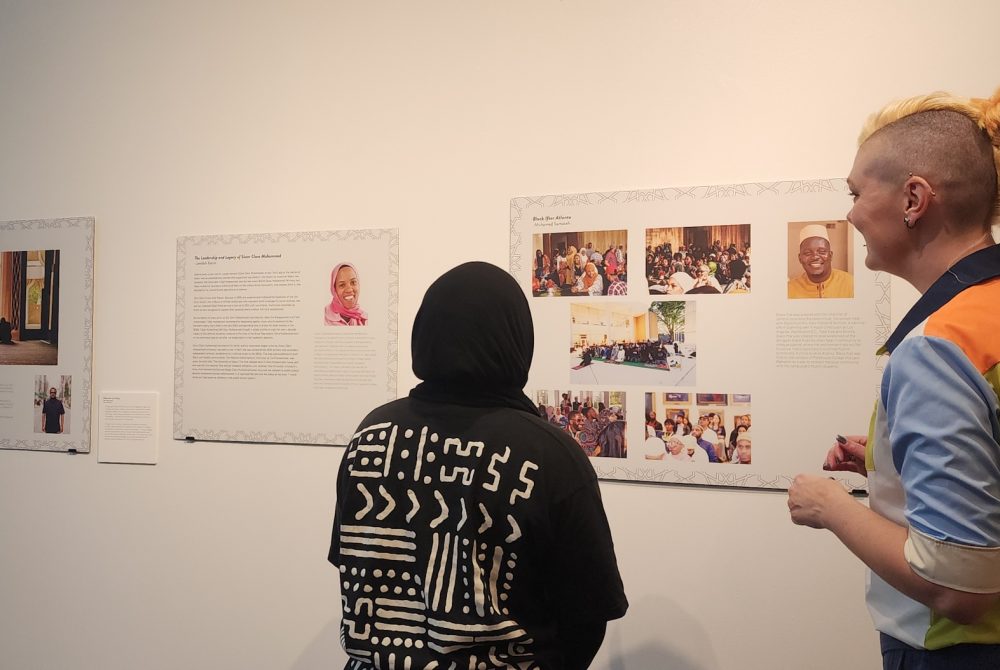
On September 20, a three-year, traveling multimedia exhibition kicking off at Atlanta’s Auburn Avenue Research Library will shine a light on the central place of generosity in the faith and lives of American Muslims. Chicago’s WF Fund and the rest of the team that’s funding and organizing the Inspired Generosity event series hopes that their project, which will subsequently tour cities including New York, Minneapolis and Seattle, will help change a popular narrative that all too often paints Muslims as religious zealots or terrorists. Beyond that, Inspired Generosity encourages people to expand their idea of just what philanthropy is — and who actually counts as a philanthropist.
Celebrating everyday, person-to-person philanthropy
The inspiration for Inspired Generosity originally came to WF Fund President Dilnaz Waraich while on a walk in 2021, when she listened to a podcast about the exhibition “The Soul of Philanthropy: Black Giving From Generation to Generation,” a multimedia look at centuries of giving by Black Americans.
“I’m walking, and I’m looking at these pictures and reading these captions, going, ‘Oh my God, I didn’t even know these stories and the impact they made in America, and the richness of each one of these philanthropists,’” she said. When Waraich began her 2022-2024 fellowship with the National Center for Family Philanthropy, she was asked during an interview how she would like to change philanthropy.
The answer “was really a no-brainer – I would tell the Muslim-American story of philanthropy,” she said. In addition, she said, Waraich would also ask other family foundations if they are truly living their missions by building relationships with all of the nonprofits in their geographic areas. From those goals, the concept behind Inspired Generosity was born.
“The shortest distance between two people is a good story,” she said. Waraich hopes that the Inspired Generosity exhibit, and the process of building host committees in the cities where it will be displayed, will build relationships between funders and organizers in those communities while using the power of stories to push back against the negative images of Islam and Muslims that are so dominant in the U.S.
But first, Waraich needed to persuade Muslim Americans to open up and share their stories, something she admitted wasn’t easy to do. That’s partly because Islam discourages believers from boasting about the good they do. But it’s also because, as a marginalized community, “when you’re told over and over again that your story isn’t important, and your story can’t be told the way you want it to be told,” people wonder why they should take the risk, Waraich said. Once the floodgates finally opened, though, the team eventually received 200 generosity stories.
A sampling of written submissions shared with IP demonstrates a deep, defiant and joyous understanding of the essential value of generosity, both as an Islamic imperative and as a set of actions that create bonds between people. One story shares the writer’s love of actively appreciating her mother with words and gifts; another talks about how their mother, a physician, worked with others to open a health center in their local mosque to serve people who otherwise wouldn’t have had access to health services. One writer talked about the generosity to newer immigrants shown by an existing Muslim-American community; another contrasted their experience of online hate from a non-Muslim American with the generosity of their neighbor, also not a Muslim, who helped the writer get their driver’s license.
In other words, these aren’t the traditional philanthropic stories of a wealthy individual or foundation descending from on high with a six-figure check; instead these tales are about everyday, person-to-person giving that adds up to something more important than money. In addition to written stories and poems, the exhibit will include music, recorded accounts, an artist painting live before exhibit attendees, and even paper lunch bags created by students talking about generosity. “We had to make sure we get the visual, the auditory and the kinesthetic learner really touching, feeling and hearing these stories,” Waraich said.
The WF Fund has contributed an initial $200,000 to the project, which will cost an estimated $80,000 – $100,000 per host city, depending on the number of related events each community decides to produce. So far, the National Center for Family Philanthropy, The American Muslim Community Foundation and the Community Foundation of Greater Atlanta (CFGA) are among the exhibit’s other supporting partners. CGFA is funding the opening event in Atlanta, while the others are committed to supporting the entire three-year showcase. Waraich said that organizers hope to recruit local funders and organizers in each host city.
About the WF Fund
While her family has been active in philanthropy for a long time — Waraich credits her father-in-law, who passed away about a decade ago, with putting her on her current path — the WF Fund itself only became an institution when the family started an LLC in 2018. Today, the family moves money through a DAF, personal checks and a family trust held in two separate charitable lead annuity trusts. The fund moves roughly $5 million a year, with an average grant size of $25,000. The family philanthropy invests in three areas: civic engagement, religious pluralism, and education, with a specific interest in nonprofits that are focused on building grassroots coalitions within their communities.
The fund doesn’t accept applications, Waraich said, but “I’m always open to a conversation. I try and never say no to anyone for just a conversation.”
In addition to racial justice and efforts to encourage religious literacy, Dawn Wolfe covers issues including the struggle for LGBTQ+ equality, social justice, women’s and girls’ issues and abortion rights, and philanthropic reform.
